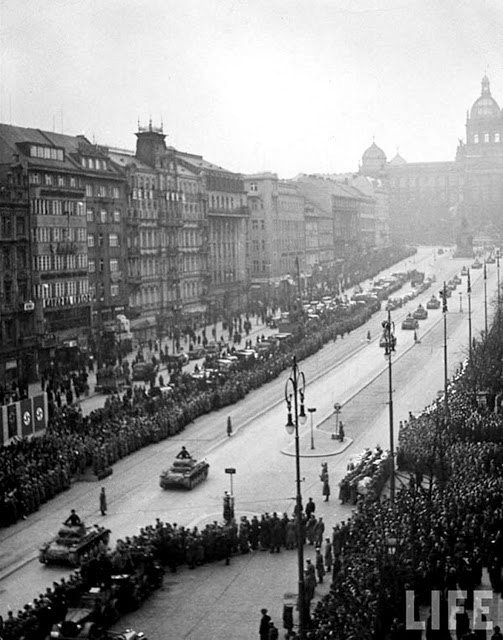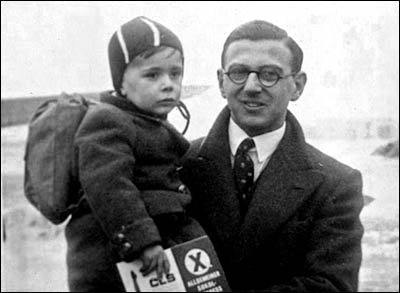
Home
Talks Nicholas Winton Audio/Video
Biography
Gallery Contact
BARBARA WINTON
Nicholas Winton
Czech and Slovak Kindertransport
The word ‘Kindertransport' is used to describe the large scale
transportation by train of thousands of endangered, mostly Jewish,
children from Austria and Germany to Great Britain in 1938 and 1939
(Kinder means children in German). The same term became used for the Czech
and Slovak rescue of endangered children which was organised in 1939 by
Nicholas Winton with the help of Trevor Chadwick and other volunteers both
in Prague and London.
Nicholas Winton (known to friends and family as Nicky) was a 29 year old
stockbroker in London, when at Christmas 1938 he was phoned by a close
friend Martin Blake. They had been due to take a party of schoolboys from
Westminster School, where Martin was a teacher, on a skiing holiday.
Martin had phoned to cancel and tell Nicky that he was in Prague and Nicky
should come out to see what he was up to.
Nicky's change of plan led him to Prague on New Year's Eve, to a meeting
with Doreen Warriner, the volunteer head of the Prague office of the
British Committee for Refugees from Czechoslovakia (BCRC) who Martin was
assisting. They were attempting to help refugees who had fled the
Sudetenland after the Munich Agreement on 29 September 1938, which gave
the Sudetenland to Hitler in return for “peace in our time”, a guarantee
by Hitler of no further expansionist claims.
Their work was mainly with those on Hitler's ‘wanted list' – basically
anyone who had criticised him, particularly Social Democrat politicians,
communists and other intellectuals, who would be arrested if they fell
into German hands. These families were being sent via Poland to safety
abroad – a huge undertaking and being accomplished in the maelstrom of a
city under siege from the thousands of refugees desperate for help – food,
money, shelter and safety.
The crisis unfolding in Czechoslovakia became clear to Nicky over the
first few days as he assisted at the offices of aid agencies and visiting
the refugee camps that surrounded the capital. Having seen the appalling
conditions families were forced to endure in the camps, he felt compelled
to try and help. He suggested to Doreen that he focussed on trying to do
something for the children who were not being considered by other groups
assisting. He found he was being asked by parents if there was any way of
their child being sent to safety in Britain and he decided to try and help
them.
While in Prague he met an English schoolmaster, Trevor Chadwick, who had
come over to sponsor two refugee boys to house at his school in Swanage.
Trevor, like Nicky, was moved by the plight of the children, and offered
to become the Prague end of the operation if Nicky could get government
permission to bring unaccompanied children into the UK.
After three weeks in the capital, Nicky returned back to work but lost no
time in getting his project off the ground. His application to the Home
Office, considered by others to be an impossible task, was soon accepted –
with qualification. He had to find a foster home and a £50 guarantee
(£2000 + today) for each child he brought over. Having got Home Office
agreement, he notified Trevor and they got underway. With the help of
others concerned for the refugees' plight, papers and magazines were
written to asking for foster parents to come forward. Other organisations
and refugee committees helped where they could. Gradually the transports
began.

The first group of children left the day before the Germans invaded the
rest of the country in March 1939. Prague came under German occupation and
Trevor Chadwick had to deal with the Gestapo to get exit permits for each
group of children he prepared. Over the course of the summer eight
transports left Prague for London.
Once the Germans had invaded, Doreen and her team came under scrutiny and
had to flee before they were arrested for helping wanted adults escape.
Trevor soon followed as his own activities, perhaps assisting Doreen, were
thought to endanger the Kindertransport programme.
R.J. Stopford, the official at the British Legation in Prague, who had
been supportive of Warriner's work whilst appearing to remain above
suspicion to the Germans, also left in May. The Kindertransports continued
through the summer under the supervision of Mr Creighton, a British civil
servant, followed by Mrs A.E. Guthrie who only left Prague after war
started.
The largest transport of 250children, organised to leave on 1 st
September, was cancelled on the day by the Germans. They had invaded
Poland and all borders were closed. Two days later Britain declared war.
It is thought that nearly all the 250 children due to leave on that train
were eventually sent to Terezin, and on to Auschwitz.
As no further transports could be organised, the operation was wound down
and Nicky, having already left the Stock exchange in August, volunteered
for the Red Cross. Later he entered the RAF as a night flight trainer. At
the end of 1939, a fellow volunteer on the Kindertransport project put
together a scrapbook of letters, reports, photos and other documentation
from their work and gave it to Nicky as a memento. Fifty years later the
scrapbook became the catalyst that brought the story of the Czech and
Slovak Kindertransport into public view.
This description is necessarily brief. Further details of this episode are
found on the internet or in the biography: If
it's Not Impossible… The Life of Sir Nicholas Winton.

Hansi Beck.
On 12 January a flight set off from Prague to London with twenty
children on board. This had been funded by the Barbican Mission, an
organisation whose purpose was to convert Jews to Christianity.
Nonetheless desperate parents had agreed to this and were sending their
children to the Barbican's residential home in England. Nicky's
involvement was purely logistical so he went to the airport to see it
off, along with a cohort of journalists and cameras. This is where the
photo of Nicky holding a young boy in his arms was taken. The boy, named
Hansi Beck, sadly died later of an inner ear infection.
_________________________________________________________



